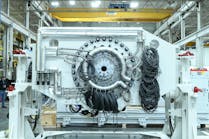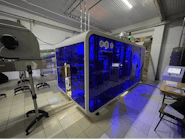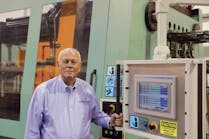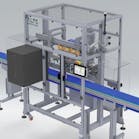For 21 years, Steven Rocheleau has headed up Rocheleau Tool & Die, a blow molding equipment manufacturer established in 1938 by his grandfather.
Since he was young, Rocheleau was groomed to work in the family business, which today is owned and run by descendants of founder Leopold A. Rocheleau, known to friends and colleagues as “L.A.”
“I’ve been very fortunate to be part of this team with my siblings and my cousins,” Rocheleau said. “I think it’s a dynamic that if you ask most people to do a business study, and you said there’s going to be seven loosely related cousins that are going to try to run this business together, you’d probably be like: ‘You guys are nuts.’ But it worked for us because of the personalities and the dynamics and the skills of the people that were here. It allowed us to do a lot of things that maybe some others wouldn’t have, but just being part of that team has been a blessing.”
The company started as a one-man machine shop operating out of L.A.’s home. Over the years, it grew and moved into a dedicated machining facility in Leominster, Mass. Today, it is in Fitchburg, Mass.
L.A.’s children, including Steven’s father, joined the company and expanded the product line to include blow molding machinery in the early 1960s. Today, the company manufactures blow molding machinery, blow molds and automation equipment sold worldwide.
Rocheleau Tool & Die has customers in Australia, Indonesia, Saudi Arabia, Thailand and throughout Latin America.
Rocheleau recently discussed the company’s evolution and the future of the industry with Plastics Machinery & Manufacturing Senior Staff Reporter Bruce Geiselman.
What was your first job out of college?
Rocheleau: I came straight here. It was interesting. Coming out of Bucknell, I had an offer to work for Procter & Gamble in their management trainee program and had some pressure back home from my family to come back and get a foundation here. I made the last-minute decision to come straight back here after college.
What made you decide to pursue a career in blow molding machinery?
Rocheleau: From birth, the company was always a big part of our life. My grandfather started the company. We grew up always being exposed to the shop. My dad used to bring us in as kids from a young age. I was working on the weekends cleaning the shop and whatnot. It was always part of what I did, but more from the pure manufacturing [machine shop] side.
It was after graduating from Bucknell and coming in full-time that I made the commitment for that next seven-and-a-half-year period to work on the floor assembling machinery, doing field service and processing of the blow molding machinery. I spent that time getting much more acclimated to the plastics side of the business and the machinery that we build.
When I was younger, I was just working in the machine shop and not in the plastics-related business.
Tell me about the history of Rocheleau.
Rocheleau: My grandfather started the company in a shop that he had at his home in 1938. In 1941, my dad was born. He was the youngest of seven children. His mom died at childbirth.
My grandfather, almost by necessity, committed even more significantly to the business at home because he had to be at home to manage the rest of the family as well as the business. Through those years in the ’40s, ’50s, and ’60s, there were four sons and one daughter who were active in the business and worked here.
My grandfather passed away in the mid-1970s, and the four brothers took over the company at that point. But in the early years, they did a lot of just general machine shop work.
My grandfather had designed a line of cutter grinding fixtures back in the day when all the machine tools used to have to be sharpened. He made a line of fixtures to hold the tools while they were being sharpened. The company always had a product that they manufactured. It wasn’t just doing machine shop work.
As we went through the ’50s and into the ’60s, they were located in Leominster, Mass., which is commonly referred to as the birthplace of the plastics industry in the United States. A lot of the first injection molding was being done in the development of plastics in the Leominster area. So, a lot of the work they started getting was related to plastics.
In the early 1960s, my grandfather and the first engineer, the first designer that worked here, Roger Nault, came together and built the first blow molding machine that we built in, I think, 1964.
Roger, when he had been working outside the company, saw the first blow molding machines coming in from Europe, and he realized there was an interesting opportunity. What was coming in from Europe was fairly expensive. It was hard to bring stuff in. He decided to come up with a local solution that could handle a large part of that market. Starting in the mid-’60s forward, the transition of the company changed from manufacturing and job-shop and tool-related work to machinery building.
Then in the late ’60s to the early ’70s, they made both a small plunger-style injection molder and the blow molding machinery line. In the early ‘70s, they decided the path was more clear to follow and pursue the blow molding route, so, they abandoned the injection side and focused just on the blow molding machinery manufacturing.
How many family members work at Rocheleau?
Rocheleau: We still have a number of us. In May 2001, a group of seven of us that are related — siblings and cousins — put a package together to buy my father out when he retired in 2001.
Until just a few months ago, we had that group of seven as the owning and managing group for the last 20 years. Two of our partners retired at the end of June this year, so there are five of us, and then there is the fourth generation of Rocheleaus working here full time, and a couple of spouses and other family members. There are about 11 direct family members working here out of 65 employees.
How difficult is it for you to compete with larger manufacturers in Europe and the inexpensive machines produced in Asia?
Rocheleau: Sometimes I wake up in a hotel room halfway around the world and I’m asking, “God, how did you get me here and how do we stay here?”
We were fortunate that when I was coming into the business, two of my cousins were very passionate about blow molding and plastics. We ended up with a group of people who are dedicated and talented in what they do. It allowed us to take on the competition and never dwell on the fact that we’re smaller and maybe not as deep in support as what some of our competitors are.
There’s a little bit of that Yankee manufacturing [spirit] that my grandfather instilled in all of us. In my grandfather’s journal, he wrote: “Fear no task.”
It’s always kind of a mantra here that we make a decision and move forward. Analyzing and forecasting is important, but we also believe you don’t want to overanalyze and have analysis paralysis.
Being a small manufacturer in the global market, you have competition on one end from high-tech, high-cost equipment from some parts of the world and low-cost options on the other. Sometimes, depending on what project we’re on, we’re either the expensive option or the cheap option. We find ourselves in the middle very, very often.
One of the things that’s unique about blow molding is it’s far more of a niche market than injection molding. There are some things that we do differently that put us in a competitive position. Then, there are some things that we don’t do and we simply walk away from. We have to focus on the kinds of things we do well and then say, we’ll sell that anywhere in the world because I know it’s the right way for this kind of production. ... It’s always application-driven.
What type of technology does Rocheleau equipment employ?
Rocheleau: We are in extrusion blow molding, and more specifically, most of what we do is manufacture reciprocating-screw process machines. It’s an intermittent extrusion. Our extruder works much like an injection molder where the screw turns, and it moves back to a fill point. When we open the mold, we quickly extrude the parison, and the mold closes and we blow the bottle directly in the extruder station. While the mold is closed, just like on an injection machine, your screw is turning back for the next shot of plastic. It kind of mimics an accumulator-head process, but it’s more suited to multiple heads for containers rather than for producing large parts like an accumulator-head process. That’s very different than a lot of other machines.
There are applications where either the reciprocating screw or the continuous [extrusion] would be a better choice, and then there is a whole lot of gray area in the middle where both are good. That’s where we’re competing more directly with some of the other players in the extrusion blow molding market.
There are a couple of markets that are big for reciprocating-screw technology, like producing lightweight, thin-wall packaging. We extrude the parison very quickly, most often in less than 2 seconds, and then we close [the mold] immediately. When the plastic is molten in blow molding, you’re extruding that parison in atmosphere, and the weight of the parison with the melted plastic tends to stretch, and the plastic only has so much strength in the molten condition.
On a continuous extrusion machine, if you have a 15-second cycle, the parison is hanging for 15 seconds before the mold comes back and grabs it, so the stretching is more of an issue with the continuous process. Because we extrude quickly and clamp and blow immediately, we can typically make lightweight containers faster than you could on a continuous extrusion machine.
Things like dairy bottles, lightweight packaging, even lightweight industrial packaging, bleach bottles, wide mouth canisters for wipes, those kinds of things all lend themselves very well to the reciprocating screw process.
What impact has the pandemic had on your business?
Rocheleau: Most of the blow molding industry was pretty busy throughout COVID. We were thrust into a situation with a lot of people needing packaging to deliver sanitizers and everything cleaning-related, from bleach to hand wipes to hand sanitizer. If you could make a bottle that could package sanitizer, for a while, you were pretty busy.
Then there was a whole section of the market for us that was in medical device and testing equipment for COVID. We were very fortunate to work on an extremely large project for us. It involved dozens of machines making little eyedropper parts that were used in COVID test kits. It was a big boost of business.
The challenge was trying to manage the workforce through the time of uncertainty of COVID. We were making big commitments on getting equipment done and out, and the uncertainty regarding the supply chain and employees being able to come to work was a big stress for quite a bit of time.
Are things starting to return to normal?
Rocheleau: We’re starting to see a return to normal with more normal levels of business, but still, the issues of the supply chain exist. We have long lead times for materials. Things that you would normally consider stock industrial products are taking weeks, if not months, to get, so the challenges of forecasting and staying ahead of what we need in order to be able to keep producing equipment is a big challenge today.
How has the blow molding industry changed since you began working at Rocheleau?
Rocheleau: A lot of the changes are processing-controls-related. There have been a lot of gains in that area with improved speed and repeatability.
Many of the projects we were involved with in the early years were custom molding applications, not necessarily bottles or packaging. Different shape parts requiring secondary manual labor in many cases. Because of the labor, much of that type of business left the U.S., and we realized we needed to shift to high-speed, multi-cavity production for bottles in order to grow our business.
A lot of the progress for us has been in bottle handling — everything from handling resin coming into a plant through bottles going out of a plant. What gets considered part of the blow molding project has expanded for us and I’m sure many, many other manufacturers. Nobody just buys a blow molder to stick on the floor. They want it to be part of a process, and that can involve everything from resin in to bottles out — packaging, handling, labeling, all kinds of leak testing and different functions involved in being able to sell bottles. It’s more of a systems approach, I would say, now than it was when I started.
It can be either supplying or recommending things from material silos, vacuum loading systems, blenders, hopper-loaders, color feeders — everything to get the plastic into the blow molder, which we make. Then it’s taking the bottles from the blow molder by automation or conveyor, trimming, and getting the bottles from the blow molder to boxing or bagging equipment. Our projects can be involved in that whole system from feeding the resin to the machine through packaging the bottles that get made on the blow molder.
In your early days, who was your mentor?
Rocheleau: Obviously, my uncle and my dad were a big part of my life and training. But one I will tell you that is a little outside of that box would be my Aunt Irene, who worked here for 49 years. When my uncle retired in early 1996 and I moved into the office, Irene was the one who was tied tight in the history of the business. When we were moving forward, she was such a grounding force for me.
I was coming into the office in a machinery sales role for the first time, and she was a sounding board, somebody who would say, “you can do what you want, but do you really think that’s a good idea?” She would never tell you what to do, but she was very grounded and had such experience for many years and was invaluable in setting a foundation for me moving forward.
What major challenges did you encounter as your business grew?
Rocheleau: The first challenge was when we bought the company from my dad in May 2001, and then in September, we had 9/11. As six-month owners of the company, we were facing this major crisis of 9/11 and the impact that had on the business for the next couple of years. We kind of hit the ground and immediately faced some adversity.
The things that are outside of your control are the biggest challenges — things like 9/11, things like COVID, things like legislation about sustainability. Things beyond our control are harder to deal with than how we are going to compete against XYZ company from another area of blow molding.
Was there any equipment investment that marked a turning point for the company?
Rocheleau: We’ve made a commitment to manufacturing here, which is a little different. A number of our competitors are focused on engineering and assembly only. We still make whatever we can here in our own machine shops. We have a continuous investment in manufacturing capacity and CNC equipment to make our own parts. We feel it helps us to be more cost competitive and reactive to customer needs.
How important is Industry 4.0 and what will be its impact on the plastics industry?
Rocheleau: It’s definitely growing. It’s taking hold, but probably more so in injection and maybe extrusion processes. Blow molding has been a little slower to embrace the technology.
I think there are isolated areas where it makes a lot of sense for monitoring motors and pumps and things like that. There is still a big reluctance among a lot of people to be connected from a data security issue. Having a machine connected all the time is still a challenge for a lot of people. I think that will be something that keeps the growth slower for a while, but I think it will continue to be a bigger part of what we do.
What will be the next major development in blow molding?
Rocheleau: Probably the biggest thing that’s going to affect blow molding is going to be the development of resins, the recyclability of material and how we process those kinds of materials. Those changes potentially are going to be driven by the materials side more than the machinery side. The machinery side will have to be somewhat reactive to those changes in resin as we figure out how to process the resin.
How important is sustainability? How is your company addressing it?
Rocheleau: It’s a big factor for us right now because plastics is a little bit embattled. The threat of legislation against plastics and packaging is a challenge. From a science standpoint, plastics is far and away the best option compared to most other options — paper, glass, metal. The issue with all these products is solid waste management, reduction, recycling and reuse. Plastics is part of that solid waste issue, but most often plastic has the most favorable carbon footprint impact in comparison, so legislating against plastics is making the problem worse before it gets better and kind of takes us out of the solution. As a small company, it’s hard to be on the forefront of driving, changing technology, but it’s something that we’re very focused on and very conscious of because it directly affects what we do.
Do you have any hobbies?
Rocheleau: Yes. We live on a lake. A lot of what we get involved with involves boating and fishing and swimming in the summertime, and then ice fishing and bonfires and ATVs in the winter. We’re very fortunate to have five and soon six grandchildren that are all somewhat local to me, so I get to enjoy them with all those lake-type events.
I am also very active in the community. I just served in my final year on the board of directors for the Chamber of Commerce. I was fortunate to be able to serve as the board of directors’ president two years ago. I’m involved in town politics on a town board for capital planning. My wife and I are very active in our church. The ability to give back to the community and serve is a big part of our life outside of the company.
Is there anything you would like to add?
Rocheleau: I would just say to anybody in business to embrace what you do and what your passion is and don’t be afraid to do it. Don’t let outside barriers hold you back. There’s a lot of opportunity if you just want to take it on.
Just the Facts:
Who is he: Steven Rocheleau, president of Rocheleau Tool & Die Co. Inc.
Age: 55
Education: Bachelor of Science in business administration, Bucknell University, Lewisburg, Pa.
Company founded: 1938
Year he joined: 1988
Business location: Fitchburg, Mass.
Employees: 65






